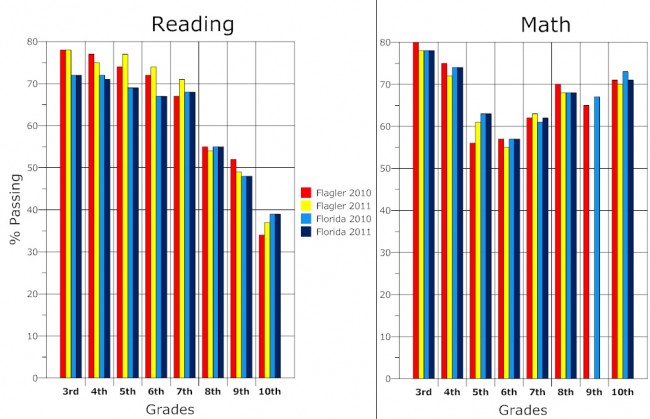
The Florida Department of Education released the largest batch of FCAT scores on Monday–the high-stakes Florida Comprehensive Assessment Test that determines the reputation and some of the bonuses school may earn, and that will next year begin to factor into teachers’ merit raises.
Following on last month’s release of 3rd grade reading and math scores, Monday’s release was for reading, math and science for all remaining grades that are tested, up to grade 11.
Overall, the district showed gains in reading in early grades, mostly exceeding last year’s results and the state’s average. But reading scores in the upper grades remain somewhere between poor and atrocious, with less than half of 9th graders reading at grade level, and barely 37 percent of 10th graders doing so. High school students may not graduate without reading at grade level. The district’s upper-level reading scores are below the state’s.
In math, too, the district’s overall average for 10th graders was a point below the state average, and below the state average for 4th, 5th and 6th graders, tying the state average for 3rd and 8th graders.
Science scores are now part of FCAT testing. Flagler students would have been better off had that not been the case. The test was administered to 5th, 8th and 11th graders. For all the technological advances in the district–advances the district touts at every opportunity–science scores came below state averages: just 49 percent of 5th graders are at grade level or better. Just 45 percent of 8th graders are. And 36 percent of 11th graders are.
Below is a chart linking to FCAT scores in reading and math by school, with comparative scores going back to 2006 for each school. Links to charter schools will be added soon.





























PCadiron says
I appears that the whole state of Florida (in the upper grades), the reading scores are atrocious. Is the whole state illiterate or is there a bigger issue here?
Tom Brown says
These test scores and their incremental moves up or down each year are meaningless unless we can compare them to national, or preferably, international test results. How are Florida high school kids doing on SATs?
Tom Brown says
OK, Google led me to this AP story from last September to answer my question posted above:
MIAMI — Florida high school seniors again scored below the national average on the SAT college entrance exam, with the class of 2010 scoring slightly lower than 2009 did.
Test results released Monday show Florida students scoring an average of 496 in critical reading, 498 in math and 479 in writing, out of a maximum 800 points in each subject. Combined, Florida’s score of 1473 was two points lower than the state scored in 2009 and 36 points below the national combined average of 1509, which was the same as a year ago. The state scored below average in every category: the national averages were 501 in reading, 516 in math and 492 in writing.
Some good news for Florida came from minority students, who generally scored better than their counterparts nationally. Among racial and ethnic groups in Florida, students of Mexican heritage made the largest gains in each subject, jumping 10 points in writing and 9 in reading. Black and Hispanic students overall achieved higher scores in math and reading than their respective racial and ethnic groups nationwide.
Liana G says
Our students are math geniuses and defy all norms until they get to college where the number of and offering of remedial math classes top the course catalog.
Difficulties with Mathematics – What Can Stand in the Way of a Student’s Mathematical Development?
Signs of Math Difficulties:
Language Difficulties
A student with language problems in math may
◦have difficulty with the vocabulary of math
◦be confused by language in word problems
◦not know when irrelevant information is included or when information is given out of sequence
◦have trouble learning or recalling abstract terms
◦have difficulty understanding directions
◦have difficulty explaining and communicating about math, including asking and answering questions
◦have difficulty reading texts to direct their own learning
◦have difficulty remembering assigned values or definitions in specific problems
(For the full article – http://www.pbs.org/wgbh/misunderstoodminds/mathdiffs.html)
—————-
How do I figure out math word problems (without going crazy)?
Hold onto your sanity! Word problems often trip up even the best math students. Many get stumped trying to figure out what they’re looking to solve. Without knowing what’s being asked, students have trouble making sense of all the critical information in the question.
(http://www.cliffsnotes.com/Section/How-do-I-figure-out-math-word-problems-without-going-crazy-.id-305405,articleId-29282.html)
————
A 9th grade FCAT released math problem (2006)
Lt. Dahlia Johnson is a jet pilot in the United States Navy. After her jet is launched
from the flight deck of an aircraft carrier, the jet’s altitude above sea level increases at a constant rate of 95 feet per second.
If the flight deck of the carrier is 90 feet above sea level, which equation could be used to find t, the number of seconds it will take Lt. Johnson to reach her cruising altitude of 30,000 feet above sea level?
Proud of BTES says
Looks like BTES is back on their perch, for the most part. :)